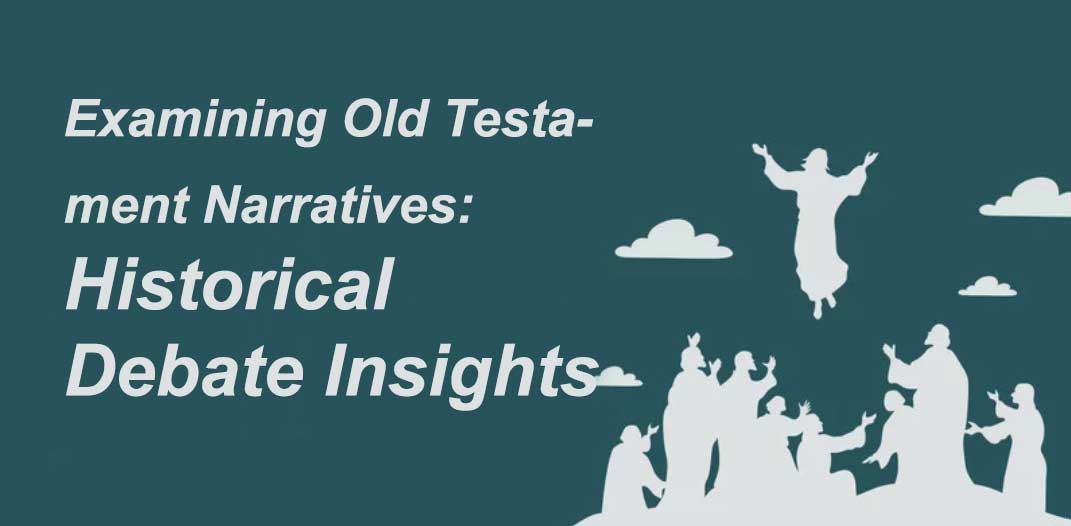The historical accuracy of stories from the Old Testament is often debated among scholars and remains a complex issue. Looking into these discussions can teach us much about the past, including aspects of ancient society, faith, and cultural practices. The debates range from who wrote these texts and when they were written to what can be learned from archaeological digs and their findings. Studying these stories leads to a better understanding of the varying perspectives on theology and interpretation, and can show how these age-old writings still have meaning for modern beliefs and society.
To make sense of these ancient writings, it's beneficial to grasp the different theological interpretations and the impact they have on today's religious practices and beliefs. The Old Testament is not just a collection of religious stories; it's a window into the life and times of ancient civilizations. Understanding these texts in their historical context can give us a clearer picture of how they have shaped contemporary culture and faith.
When examining Old Testament narratives, it's not just about reading ancient texts; it's about connecting with history. These writings offer a unique perspective on ancient peoples' beliefs, values, and daily life. This connection to the past can inform our present, offering lessons and insights that are still relevant today.
In our quest to understand these narratives, we also encounter the fascinating field of archaeology. The physical remnants of ancient civilizations, unearthed by archaeologists, provide tangible evidence that can either support or challenge the biblical accounts. These discoveries often spark lively discussions and can lead to a richer, more nuanced understanding of the past.
In conclusion, delving into the Old Testament narratives is more than an academic exercise; it's a journey that can enrich our understanding of human history and its ongoing influence on the world today.
Key Takeaways
The authenticity of the Old Testament's stories is a hot topic among researchers. These discussions shed light on ancient societies, their beliefs, and way of life. Scholars argue about the origins of these texts, their authors, and the time of their creation. They also examine what archaeological sites reveal about these tales. By studying the Old Testament, we gain insights into different viewpoints on theology and how these ancient stories resonate with us today.
Understanding the various interpretations of these scriptures helps us see their role in current religious practices. The Old Testament isn't just about faith; it's a glimpse into the lives of long-gone civilizations. Placing these scriptures in their historical setting helps us see their influence on today's culture and beliefs.
Looking at these narratives connects us with history. They offer a glimpse into the beliefs, principles, and everyday lives of ancient peoples, providing valuable lessons for the present.
The field of archaeology also plays a role in our understanding of the Old Testament. Artifacts and ruins found by archaeologists can confirm or contradict the biblical stories, often sparking intense debates and leading to a deeper comprehension of history.
Studying the Old Testament is a way to deepen our knowledge of human history and its lasting impact on the modern world.
Custom Quote: "To engage with the Old Testament is to thread the narratives of the past into the fabric of our current understanding."
Historical Accuracy Debate Overview
The debate around the historical accuracy of Old Testament stories is a complex issue that requires careful examination of evidence and scholarly opinions. The core of the discussion is whether the events, people, and places described in the Old Testament are factual. Scholars read the texts closely, looking for any historical errors, signs of times that don't match the story's setting, and societal details that would place the stories within their true historical context.
When assessing the validity of these ancient narratives, it's also important to consider how dependable the sources are and to recognize any potential biases that could have shaped the way events were recorded. Additionally, the conversation includes looking at archaeological discoveries to see if they confirm the Bible's stories.
Understanding the historical accuracy of the Old Testament is more than a scholarly pursuit; it provides us with a window into the past. This investigation is key to understanding the ancient world as depicted in these religious texts.
Custom Quote: 'Unearthing our past calls for a meticulous study of history, where evidence and open-mindedness lead the quest for truth.'
Remember to approach this topic with an open mind and to consider all the linguistic, archaeological, and historical data available. Only then can we hope to piece together the realities of the ancient world chronicled in the Old Testament.
Authorship and Dating Controversies
Examining the Old Testament's authorship and dating calls for a careful look at historical, linguistic, and textual clues. The debate over who really wrote parts of the Old Testament, like whether Moses penned the Pentateuch or if later editors did, is heated among scholars. This argument is based on differences in language and style in the texts, which hint at various authors or edits over time.
The timing of when these texts were written also stirs up debate. Pinning down the date can change how we see its historical and cultural relevance and its trustworthiness as information. Take the book of Daniel; its dating is hotly contested, affecting how we view its prophecies and historical claims. To argue for different dates of composition, scholars look at historical mentions, changes in language, and how the text is structured.
Understanding who wrote the Old Testament texts and when comes down to carefully looking at all the evidence.
Authorship and Timing: Why They Matter
Knowing who wrote the Old Testament and when isn't just academic—it shapes how we understand history and culture. It helps us see the world through the eyes of the people who lived back then. And while we know the debates can get complex, they're worth diving into for the insights they offer.
Archaeological Evidence and Findings
Debate over the Old Testament's authorship and dating has prompted extensive research into archaeological evidence and findings, shedding light on the historical and cultural context of the texts. Ancient artifacts and the remnants of ancient civilizations have played a crucial role in providing tangible evidence of the events and cultures described in the Old Testament narratives.
Through the excavation of sites such as Jericho, Megiddo, and Hazor, archaeologists have unearthed structures, pottery, and inscriptions that offer insights into the material culture and societal practices of the ancient Near East. These findings not only validate certain historical details mentioned in the Old Testament but also provide a deeper understanding of the broader historical and cultural landscape in which the events took place.
Moreover, the discovery of ancient texts such as the Dead Sea Scrolls has provided invaluable linguistic and historical parallels to the Old Testament narratives. The parallels between the Dead Sea Scrolls and the Old Testament texts not only attest to the antiquity and preservation of the biblical manuscripts but also contribute to a more comprehensive understanding of ancient Hebrew language, religious beliefs, and textual transmission.
These archaeological findings and ancient artifacts serve as critical pieces in reconstructing the historical and cultural contexts of the Old Testament narratives, enriching scholarly interpretations and debates surrounding the texts.
Theological and Interpretive Perspectives
A close look at the Old Testament stories shows us that they aren't just tales from the past. They give us insights into the complex relationship between God and people, tackling moral questions and the idea of God stepping into human affairs. Scholars and religious experts use different ways to dig into these stories, such as analyzing history and literature, as well as applying religious interpretation.
One central theme in these stories is the idea of a covenant, which is like a promise between God and people. This can be seen as either a formal agreement or a sign of God's kindness and loyalty. The moral challenges in these stories make us think about fairness, compassion, and our own roles in life. People have their own ways of making sense of these issues.
To really grasp these ancient stories, we need to pay attention to the historical, cultural, and written details they contain. By doing so, we can better understand the religious messages and the various ways they can be interpreted.
For example, consider the story of David and Goliath. This isn't just an underdog tale; it's about faith, courage, and the idea that sometimes the unlikely choice is the one chosen by God.
Relevance for Contemporary Faith
In contemporary faith, it's essential to critically examine the relevance of Old Testament narratives in order to understand their impact on modern religious beliefs and practices. The contemporary relevance of Old Testament narratives lies in their potential to provide insight into enduring human experiences, ethical dilemmas, and the nature of the divine. These narratives offer a window into the historical and cultural context of ancient Israel, providing valuable lessons and moral teachings that can still resonate with individuals today. By exploring the faith implications of these narratives, believers can glean wisdom and guidance for navigating complex moral and spiritual challenges in the modern world.
Understanding the contemporary relevance of Old Testament narratives also allows for a nuanced approach to interpreting and applying these ancient texts within a modern faith context. It prompts believers to critically engage with the narratives, discerning the underlying principles and timeless truths that transcend cultural and historical boundaries. Moreover, it encourages a thoughtful consideration of how these narratives can inform and enrich contemporary faith practices, ethical considerations, and theological reflections.
Ultimately, recognizing the relevance of Old Testament narratives for contemporary faith enables believers to draw upon the wisdom of the past to inform their present spiritual journey.




